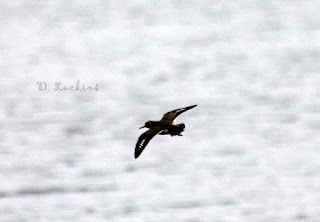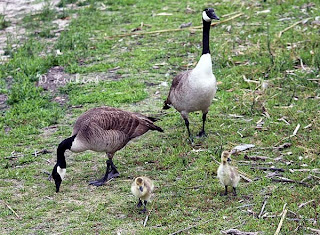After a long while of seeing no ducklings, a mom showed up with what looked like 13 ducklings (or maybe 12, hard to say as they move around so fast). 11-12 were with her, and one was near another female. That one will be talking about later.
She had a little yellow-ish one:
Competing for flies:
I think the mom might be Trouble's mother from last year.
Here, they were passing by a gauntlet of about 30 gulls. Though the gulls seemed interested and, for a moment, I thought they were going to grab one, they didn't bother the family.
Two tired ducklings:
A duckling-napping in progress:
One duckling seemed to be hanging back with another female. I don't think he was her duckling. Later, when the ducklings went back toward this female, she attempted to steal three more of them. She approached this duckling who was screaming for the real mama. She began doing "mama talk" to the baby, but I think the baby was scared of her.
She ended up going back to her real mother:
She attempted to "mama talk" this one to her as well:
Then, this one, who was spending time with her before, went back to the shore and she followed:
She began "mama talking" and showing this one what to eat and was never aggressive towards him.
Though I saw the original mother with the 11-12 ducklings, later, this mother and this duckling disappeared. I've seen this happen before. Female ducks, this time of year, often get raging hormones, but either can't or don't want to sit on eggs. So, when they see a large brood of ducklings under three days old, they will act like they're the mother. Sometimes, a few ducklings will begin to follow her instead of the real mother. Sometimes, these duckling-nappers end up being better mothers than the real mother. One duckling-napper raised four babies out of the 9-10 the real mother had. The real mother lost all of hers.
This seems to only happen during the bonding period, up to about three days old. After that, the original mother will attack any babies she doesn't think are hers, including ducklings that have been "away" for that long. Also, mothers who don't have the hormonal change will attack babies as well.
The two babies are still doing OK, but are very brave. The other five are getting very large and are starting to feather out.
We had a large number of Canada geese show up at the lake. The four unmarried teenage geese were checking them out. But, their original father brutally attacked one of the young males over and over, but the youngster was OK. Some of the other geese flew off without taking any of the teens with them. I'm hoping that the teens will follow the migratory geese out of the area.
There were also lesser scaup there, a bit late for them:
And, a white-faced ibis came to visit.




















































